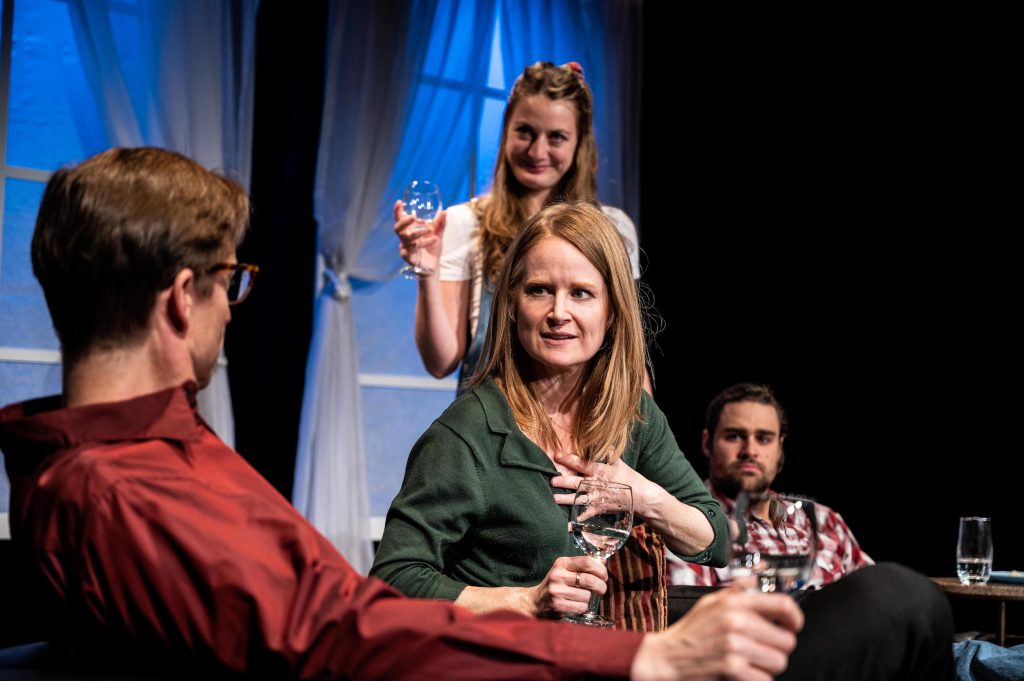
Credit: Max Montesi
At PAL Studio Theatre until February 29, 2020
Tickets from $35 at brownpapertickets.com
Posted February 23, 2020
‘In vino veritas’ the saying goes. But just how much ‘veritas’ can this group of six 30 or 40-year-olds handle?
Sarah has thrown herself a birthday party; dirty dinner plates and scrunched up serviettes litter the coffee table. The cake has been gobbled up and much wine has been consumed. The guests are killing themselves laughing over some anecdote as the curtain rises and now Brenda (Suzanne Hepburn) and Jessica (Missy Cross) are sharing stories about their first loves. Brenda recalls a mentally handicapped guy who played trumpet in the high school band and whose chocolate-coloured nipple, peeking through his open shirt, drove her mad with desire. “He was hot”, she says, still with obvious excitement all these years later. Demanding equal time, Jessica relates how she was “dry-humped” recently by her boss but then goes on to tell how happy she was sharing the “rumble seat” with her girl cousin when they were adolescents.

Credit: Max Montesi
Brenda’s somewhat uptight husband Bill (Stephen Park) is titillated by the stories but Jessica’s foul-mouthed husband Alex (David Lennon) complains, “I could be home, downloading shaved Asian pussy”.
Sarah (Leah Jacksties), the birthday girl, seems out of it; too much alcohol or just a little off? Maybe pregnant? Her husband Charlie (Cody Kearsley), however, sits brooding, not drinking and on the verge of exploding. Which he does. Quietly, menacingly, condescendingly.
We’ve probably all been to parties where the shit hits the fan but playwright Bill Marchant puts all that shit in a pressure cooker and turns up the heat. When sullen Charlie challenges the rest of them by claiming that he doesn’t care for anyone or anything and none of them does, either (it’s all about fucking and fighting, he claims), the party takes a nasty turn.

Credit: Max Montesi
Vagrant Players Theatre Society posts a warning: 18 years and older. They could also warn against those with delicate sensibilities: a lengthy scene with one guy’s hand down another guy’s pants is hilarious. “I’m fearless”, hollers Alex, fingering Charlie’s bare cock, but his wife snorts derisively, “He’s afraid of his own penis.”
Darkly funny and deeply disturbing, Pot Kettle Black questions our capacity for love or even for caring. It’s ripe with homoeroticism, despite the heterosexual pairings, and there is one very distinct parallel to the Crucifixion. We really do begin to question whether any of these characters cares about anything and, by extension, we are persuaded to examine – if we dare – ourselves.

Credit: Max Montesi
Expertly directed by Marchant’s partner Matt Fentiman, this sextet turns in stellar ensemble work. While individual performances are outstanding, Pot Kettle Black is more than the sum of its parts.
Warnings about the production include “No dogs” and while that’s witty and hip, I actually was frequently reminded of certain breeds. Hepburn’s Brenda is the pitbull: well-muscled and ready to rumble. Quick to take offense and determined to see the situation to the bitter end, Hepburn shows no sweetness or softness. Lennon’s Alex is the terrier that barks and barks, egging other dogs on in a fight – only to find himself suddenly and reluctantly dragged into the fray. Cross, as Jessica, is the Sheltie: pretty and vocal but quite able to take a sly bite out of the heel when you’re not looking. Jacksties, as Sarah, is the snoozy Labrador retriever, happy to watch it all go down but not really interested in the dogfight; Park, as Bill, is the spaniel: quietly on the sidelines until another dog makes a move on his dinner dish.
And Kearsley’s Charlie? The big, quiet, handsome dog that appears to be friendly but when you reach out to pet it, saying “Nice dog”, it bares its teeth and snarls.
I’d have to read Brenda’s long monologue at the end to understand it completely. Mostly, I just wanted to strangle her – and that’s to actor Hepburn’s credit. She’s so wired, she vibrates.
The dialogue crackles and in our darkest moments perhaps we wonder if, like Charlie, we’re all faking it because life would be unbearable otherwise. That’s a very sour outlook given the play’s funny spin.
Ironically, playwright Marchant is warm, amiable – even jovial – so it would appear he has asked these questions of himself over the decade of working on Pot Kettle Black and decided, ultimately, he cares. Why else would he write plays?

